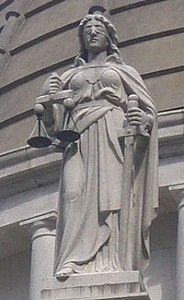Banner decision upholds property rights
by CalWatchdog Staff | July 1, 2013 2:07 pm
 [1]July 1, 2013
[1]July 1, 2013
By Katy Grimes
SACRAMENTO — The Pacific Legal Foundation[2] just won an important property rights case.
The U.S. Supreme Court case expanded the right to just compensation to “non-takings” of property in Koontz v. St. Johns River Management District.[3]
Paul Beard, the PLF attorney who litigated the Koontz case, said the decision is important for property owners because no longer will the government be able to force them to apply for permits to pay money to the government without constitutional scrutiny on the reason for the extortion.
Until now, permitting agencies have been able to demand money for land use permits without showing just cause.
“The ruling says the Fifth Amendment protects landowners from government extortion, whether the extortion is for money or any other form of property,” Beard told me in an interview. “The Supreme Court said limits imposed by the St. Johns River Water Management District on how Koontz used his land were a ‘taking’ subject to compensation under the Fifth Amendment of the U.S. Constitution.
“The court has recognized that money is a form of property, and the Constitution prohibits grabbing money from property owners the same way it prohibits grabbing land without compensation.”
The left reacts
“The decision is a very serious loss for local governments,” said John Echeverria, a Vermont Law School professor specializing in land use and property rights, who filed a brief for state and local government associations on St. Johns’ behalf, as quoted by Reuters[4].
“It means requirements to pay fees or other payments as a condition of permit approvals will be subject to heightened scrutiny. That is a revolutionary change in the law.”
Siding with government power against private property, in dissent were the four most liberal justices: Ruth Bader Ginsburg, Steven Breyer, Sondra Sotomayor and Elena Kagan. Wrote Kagan in the dissent,“The boundaries of the majority’s new rule are uncertain, but it threatens to subject a vast array of land-use regulations, applied daily in states and localities throughout the country, to heightened constitutional scrutiny.”
The Koontz family case
Even though Coy Koontz offered to dedicate much of his 11 acres for conservation, when he sought permission to develop a few acres in Central Florida, he was told he must spend up to $150,000 to improve the government’s property miles away.
The monetary expense demand by the permitting agency was far in excess of any impact that their land use proposal would create, Beard said.
The Koontz family fought this injustice in the courts for nearly 20 years, during which time Coy Koontz, Sr. passed away. The family finally won. “Their victory protects all permit applicants from government extortion,” Beard said. “Everyone who values constitutional property rights owes the Koontz family a debt of gratitude for this historic victory.”
The landmark Nollan case
The most notable previous land-use challenge was the Nollan case. In 1987, the Nollans owned beachfront property in Ventura County[5] and wanted to replace a 504-square-foot bungalow which had fallen into disrepair with a 2,500-square-foot house.
Nollan v. California Coastal Commission[6] went all the way to the U. S. Supreme Court[7] because the California Coastal Commission[8] tried to force the Nollans to give up a piece of their beach front land as a public easement as a condition of approval[9] of a permit to demolish the existing bungalow and replace it with a three-bedroom house. The Coastal Commission had asserted that the public-easement condition was imposed to promote the legitimate state interest of diminishing the “blockage of the view of the ocean” caused by the construction of the larger house.
In a highly controversial 5-4 ruling, the court ruled that the requirement by the Coastal Commission was a constitutional “taking” of private property in violation of the Fifth[10] and Fourteenth Amendments[11] of the U.S. Constitution.
Koontz SCOTUS decision
“Our decisions in Nollan v. California Coastal Comm’n, 483 U. S. 825 (1987), and Dolan v. City of Tigard, 512 U. S. 374 (1994), provide important protection against the misuse of the power of land-use regulation,” wrote Justice Alito, who delivered the opinion of the court[12] in the Koontz case. “In those cases, we held that a unit of government may not condition the approval of a land-use permit on the owner’s relinquishment of a portion of his property unless there is a ‘nexus’ and ‘rough proportionality’ between the government’s demand and the effects of the proposed land use.”
But permitting agencies spent decades working around the Nollan and Dolan decisions, which greatly displeased Alito.
“Extortionate demands for property in the land use permitting context run afoul of the Takings Clause not because they take property but because they impermissibly burden the right not to have property taken without just compensation,” Alito wrote[13]. “As in other unconstitutional conditions cases in which someone refuses to cede a constitutional right in the face of coercive pressure, the impermissible denial of a governmental benefit is a constitutionally cognizable injury.”
- [Image]: http://www.calwatchdog.com/2011/03/22/california%e2%80%99s-anti-stalking-law-throttles-small-claims-courts/lady-justice-themis-2/
- Pacific Legal Foundation: http://www.pacificlegal.org
- Koontz v. St. Johns River Management District.: http://www.supremecourt.gov/opinions/12pdf/11-1447_4e46.pdf
- Reuters: http://www.reuters.com/article/2013/06/25/us-usa-court-property-idUSBRE95O0XM20130625
- Ventura County: http://en.wikipedia.org/wiki/Ventura_County
- Nollan v. California Coastal Commission: http://www.pacificlegal.org/page.aspx?pid=1565
- U. S. Supreme Court: http://en.wikipedia.org/wiki/United_States_Supreme_Court
- California Coastal Commission: http://en.wikipedia.org/wiki/California_Coastal_Commission
- condition of approval: http://en.wikipedia.org/wiki/Exaction
- Fifth: http://en.wikipedia.org/wiki/Fifth_Amendment_to_the_United_States_Constitution
- Fourteenth Amendments: http://en.wikipedia.org/wiki/Fourteenth_Amendment_to_the_United_States_Constitution
- opinion of the court: http://www.supremecourt.gov/opinions/12pdf/11-1447_4e46.pdf
- wrote: http://www.supremecourt.gov/opinions/12pdf/11-1447_4e46.pdf
Source URL: https://calwatchdog.com/2013/07/01/banner-decision-upholds-property-rights/